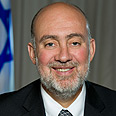
Israel says no decision on Mideast nuclear conference
UN Ambassador Prosor says Israel has made no decision on whether it will attend nonproliferation conference in Finland; adds signing NPT depends on achieving 'comprehensive peace' in region
UN Ambassador Ron Prosor said Friday that Israel has made no decision yet on whether it will attend a proposed international conference on a nuclear weapons free Middle East.
In May 2010, the Nuclear Nonproliferation Treaty's 189 members called for convening such a conference in 2012. The conference is expected to take place later this year in Finland.
Related articles:
- 'Mossad cuts back on Iran operations' Report: Israeli soldiers scour Iran for nukes Report: Israel has access to Azeri airbases
Prosor told reporters Friday that "No decision has been made regarding Israel's participation in the international conference at the end of 2012."
The United Nations is pressing for a conference this year and UN Secretary General Ban Ki-moon has previously said he hoped Israel would attend.
While there are many doubts about whether Jerusalem would send a delegate to such a summit, Prosor said that Israel would only be willing to join a nuclear free zone "when there will be comprehensive peace in the region."
Prosor said there had been too many cases of nuclear programs in the region where "the international community had very little ability" to act. He cited Iraq and Syria, where Israel has attacked nuclear facilities in the past.
Israel is widely believed to have an arsenal of nuclear weapons but has avoided confirming or denying its existence. It is not a party to the Nuclear Nonproliferation Treaty.
'Proposal targets Israel'
UN leader Ban has sought a conference on Middle East nuclear disarmament this year and he asked Finland's undersecretary of state for foreign affairs, Jaakko Laajava, to be the main planner. Finland agreed to host the event but no official date has been given.
Diplomats consider the presence of Israel and Iran crucial to the success of any conference, which was called for by the nuclear Non-Proliferation Review held in 2010.
Ban said last month that he wanted Israel to attend: "Israel will be invited and they should be there but nothing has been decided yet," he said while in Jerusalem.
The Arab proposal for a WMD-free zone in the Mideast, aimed at pressuring Israel to give up its undeclared nuclear arsenal, was initially endorsed by the 1995 conference reviewing the Nuclear Nonproliferation Treaty, but never acted on.
Israel has long said a full Arab-Israeli peace must precede any weapons bans in the Mideast. But at the 2010 NPT review conference, the United States, Israel's most important ally, said it welcomed "practical measures" leading toward the goal of a nuclear-free zone in the Middle East.
Israel views Iran as an existential threat, citing frequent calls by President Mahmoud Ahmadinejad for Israel's destruction, Iran's support for violent anti-Israel militant groups and its nuclear and long-range missile programs.
Iran insists its nuclear program is purely peaceful and aimed at producing nuclear energy, not weapons. Israel, the US, and many European nations believe Iran's goal is to become a nuclear power.
"Iran's nuclear weapons program is moving forward at the velocity of this Eurostar train from London to Paris – and the international community is like this local train stopping at each local station," Prosor said.
But he said the European Union's recent sanctions and the decision by the Society for Worldwide Interbank Financial Telecommunication – or SWIFT – to block 30 Iranian banks from its global network, making it difficult for the country to make international money transfers, "have made at least clear to Tehran that there's a certain price tag for continuing" its nuclear program.
AP and Yitzhak Benhorin contributed to the report.
- Receive Ynetnews updates directly to your desktop










